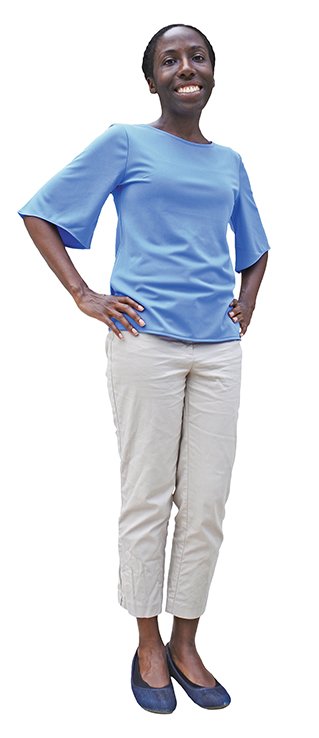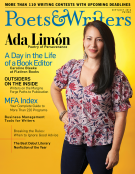In August Atria Books will release Everyday People: The Color of Life, an anthology of short stories by emerging and established writers of color and indigenous people. Edited by Jennifer Baker, a writer and longtime advocate for minority representation in literature—she has worked for the nonprofit We Need Diverse Books and hosts the podcast Minorities in Publishing—the collection features work by more than a dozen writers, including Courttia Newland, Yiyun Li, Mitchell S. Jackson, and Nelly Rosario. Baker took on the project after Brook Stephenson, the writer and bookseller who conceived of the anthology, died in 2015. While Stephenson planned for the anthology to feature only Black voices, Baker expanded the project’s focus and began soliciting other people of color and indigenous writers for stories shortly after the 2016 presidential election. The result is a collection of stories that depict the modern lives of people of color as they struggle with contemporary social, political, familial, and personal issues. Just before the book’s release, Baker discussed her work on the anthology and her connection to its mission as a writer and editor of color.

Jennifer Baker (Credit: Murray Greenfield )
Everyday People highlights the universality of human experience while also mostly adhering to contemporary social realism. When you were soliciting stories for the book, did you intend for this?
It was difficult for me to ask writers of color and indigenous writers to contribute to Everyday People so soon after the presidential election. It was and is a bad time, especially for marginalized people. The contributors are writers I contacted because their work contains a multiplicity of voices and topics. The fact that, in an increasingly tumultuous moment in history, people who are directly affected can create a high level of work in a finite amount of time that continually reflects our humanity speaks to their talent and professionalism. I gave no firm parameters to the writers for their stories, which may have helped them in the end to write broadly or tap into subjects that really speak to them.
Do you think social realism will continue to dominate the future of the short story?
That depends on the author. In Everyday People, Courttia Newland’s and Allison Mills’s stories have speculative and fantastical elements rooted in culture and place that are political, personal, and real. To me those stories also encapsulate our society today by focusing on elections or sudden loss and how to get through loss. They may not be what publishing defines as “contemporary” or “true life,” yet they are identifiable, especially to a person of color or indigenous person.
The 2017 VIDA Count shows that in most of the U.S. literary magazines surveyed more than two-thirds of women and nonbinary contributors were white. Within this landscape, what do you see as the future of multiethnic American short fiction?
The lack of representation in the industry prevents more marginalized stories from being seen by a wider audience. It wouldn’t, I hope, curtail the fact that marginalized folks are constantly creating and finding new routes for this. That said, unless we see some paramount change from the top down and from the bottom up in all areas of the industry, we won’t see a real change.
In the wake of #MeToo controversies within the literary community, Junot Díaz’s story was dropped from the book. How did you come to this decision?
Editors have a responsibility, in any and all capacity, to do what’s morally right and also what is right for the work they’re editing. As editors we have a hand in the titles we publish, and I quite literally have my name on this product. This is also an anthology; I’m not acting out of self-interest but for all those whose work is tied to this book. Hearing other women of color speak out about assault is not something I take lightly or something anyone should readily dismiss. As I told Atria when I made my decision, “This isn’t a PR move. It’s a moral one.” A friend suggested I replace this story with a list of writers of color, namely women, which I expanded as much as I could with nonbinary and transgender writers of color. It seemed the best course of action to not remedy a problem but to make use of the space in a book to further highlight writers of color and indigenous writers. It serves as a resource that reflects as many people as I could find—and while I know I missed so many wonderful artists in my scramble to create this list in two weeks, I hope it’s at least an indicator of how we can further uplift those who don’t have the platform.
What were some of the biggest joys and challenges in compiling an anthology like Everyday People?
The biggest joy was finishing it. Once contributors’ stories were finalized, I mapped out where the stories would go. Seeing first-pass proofs was rewarding because then the final contributors saw the entirety of the book and how it came together. Receiving positive reviews for Everyday People has also been incredibly heartening. The challenges were constant problem solving and also feeling the weight placed on Black women both personally but also nationwide during this time. Yet another challenge was when I experienced misogyny or hesitation to recognize privilege or when I recognized I should’ve done things earlier like utilize sensitivity readers for stories because something felt off to me.
How does wearing the editorial hat impact your own creative writing?
That I’m a very precise person makes me a strong editor and a slow writer. The inner workings of the editorial mind can be [preoccupied with]: “What does it all mean?” And in the framework of a story that doesn’t mean a narrative gets tied together with a bow, but that it culminates in an experience that seems honest for the work. So, in a way, my work as an editor complements my writing because it means I come to the page with purpose and am aware of when things aren’t working. At times it can impede upon my process because I may continually wonder: “Well, is that good enough?”
Namrata Poddar is the interviews editor for Kweli, where she curates a series called “Race, Power and Storytelling.” Her fiction and nonfiction has appeared in Longreads, Literary Hub, Electric Literature, VIDA Review, the Progressive, and elsewhere. Her debut story collection, Ladies Special, Homebound, was a finalist for Feminist Press’s 2018 Louise Meriwether First Book Award and is forthcoming from Speaking Tiger Books.








